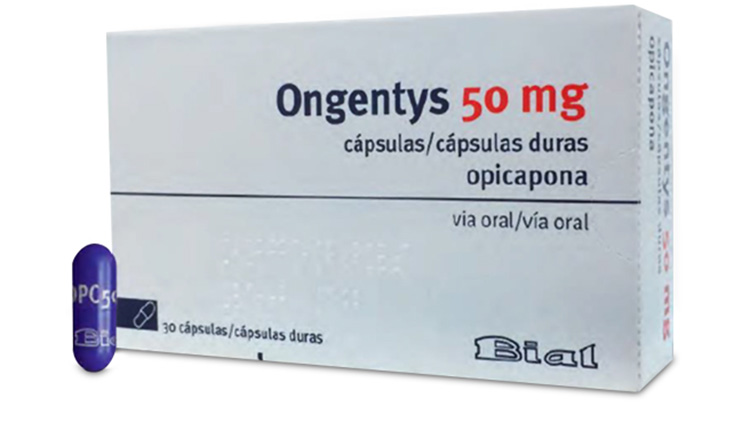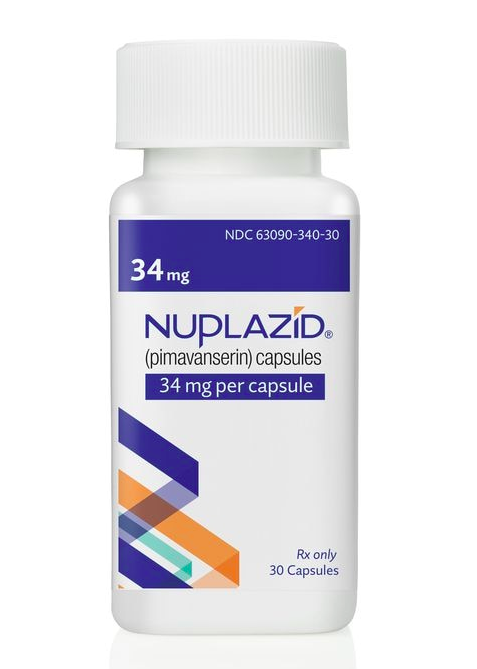Ongentys (opicapone) vs Nuplazid (pimavanserin)
Ongentys (opicapone) vs Nuplazid (pimavanserin)
Ongentys (opicapone) is a medication used as an adjunctive treatment to levodopa/carbidopa in patients with Parkinson's disease experiencing "off" episodes, where it acts to inhibit an enzyme responsible for the breakdown of levodopa, thereby prolonging its effect. Nuplazid (pimavanserin), on the other hand, is an antipsychotic drug approved for the treatment of hallucinations and delusions associated with Parkinson's disease psychosis, and it works by selectively targeting serotonin receptors. When deciding between the two medications, it is important to consider the specific symptoms being targeted: Ongentys is chosen for motor symptom management, whereas Nuplazid is selected for the treatment of psychosis in Parkinson's disease.
Difference between Ongentys and Nuplazid
| Metric | Ongentys (opicapone) | Nuplazid (pimavanserin) |
|---|---|---|
| Generic name | Opicapone | Pimavanserin |
| Indications | Adjunctive treatment to levodopa/carbidopa in patients with Parkinson's disease experiencing "off" episodes | Treatment of hallucinations and delusions associated with Parkinson’s disease psychosis |
| Mechanism of action | COMT inhibitor, which prolongs the effect of levodopa | 5-HT2A receptor inverse agonist and antagonist, which can help reduce hallucinations and delusions |
| Brand names | Ongentys | Nuplazid |
| Administrative route | Oral | Oral |
| Side effects | Dyskinesia, constipation, blood pressure changes, hallucinations | Nausea, peripheral edema, confusional state, hallucinations |
| Contraindications | Hypersensitivity to opicapone, pheochromocytoma, paraganglioma, or other catecholamine-secreting neoplasms | Hypersensitivity to pimavanserin or any component of the formulation |
| Drug class | Catechol-O-Methyltransferase (COMT) inhibitor | Atypical antipsychotic |
| Manufacturer | Bial - Portela & Cª, S.A. | Acadia Pharmaceuticals Inc. |
Efficacy
Ongentys (Opicapone) for Parkinson's Disease
Ongentys, with the active ingredient opicapone, is a medication approved for the treatment of Parkinson's disease as an adjunctive therapy to levodopa/carbidopa in adults experiencing "off" episodes. "Off" episodes are periods when the patient's medications are not working well, causing an increase in Parkinson's symptoms like tremor and difficulty moving. Opicapone works as a catechol-O-methyltransferase (COMT) inhibitor, which prolongs the effect of levodopa by blocking the enzyme that breaks it down. This results in more consistent and prolonged dopamine levels in the brain, which can help to reduce the amount and length of "off" periods.
The efficacy of Ongentys in improving "off" time was demonstrated in clinical trials. Patients treated with opicapone experienced a significant reduction in "off" time compared to placebo, without a concomitant increase in troublesome dyskinesia (involuntary movements). This improvement in "off" time was associated with an increase in "on" time, the periods when levodopa is working well and symptoms are controlled, without worsening of involuntary movements.
Nuplazid (Pimavanserin) for Parkinson's Disease
Nuplazid, whose active ingredient is pimavanserin, is a medication specifically approved for the treatment of hallucinations and delusions associated with Parkinson's disease psychosis. Unlike traditional antipsychotics, pimavanserin does not block dopamine receptors, which is beneficial since Parkinson's disease patients require dopamine for motor control. Instead, pimavanserin acts as a selective serotonin inverse agonist and antagonist, preferentially targeting 5-HT2A receptors. This mechanism of action is thought to help alleviate the psychotic symptoms without exacerbating the motor symptoms of Parkinson's disease.
The efficacy of Nuplazid for the treatment of hallucinations and delusions in Parkinson's disease was established in a six-week clinical trial. Patients who received pimavanserin demonstrated a significant decrease in the frequency and severity of hallucinations and delusions without a significant worsening of primary motor symptoms when compared to placebo. This represents a significant advancement in the management of Parkinson's disease psychosis, as it provides an option that specifically addresses the complex balance between managing psychosis and maintaining motor function.
Regulatory Agency Approvals
Ongentys
-
European Medical Agency (EMA), European Union

-
Food and Drug Administration (FDA), USA

-
Pharmaceuticals and Medical Devices Agency (PMDA), Japan

-
Brazilian Health Regulatory Agency (Anvisa)

Nuplazid
-
Food and Drug Administration (FDA), USA

Access Ongentys or Nuplazid today
If Ongentys or Nuplazid are not approved or available in your country (e.g. due to supply issues), you can access them via Everyone.org.
How it works

Make an enquiry
Choose the medicine you want to buy, answer a couple of questions, and upload your prescription to speed things up. We’ll get back to you within 24 hours.


Make an enquiry
Choose the medicine you want to buy, answer a couple of questions, and upload your prescription to speed things up. We’ll get back to you within 24 hours.


Breeze through the paperwork
We'll guide you through the required documents for importing unapproved medicine, ensuring you have all the necessary information.


Get a personalized quote
We’ll prepare a quote for you, including medicine costs and any shipping, administrative, or import fees that may apply.


Receive your medicine
Accept the quote and we’ll handle the rest - sourcing and safely delivering your medicine.

Some text on this page has been automatically generated. Speak to your physician before you start a new treatment or medication.
Let's talk
If you have any questions, call us or send us a message through WhatsApp or email:
Contact us




